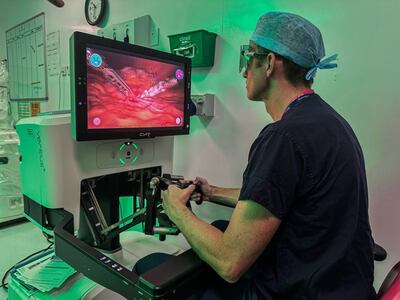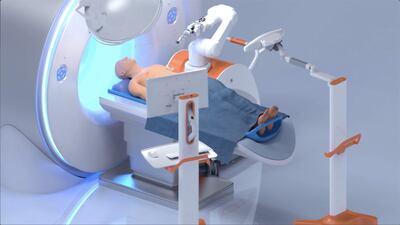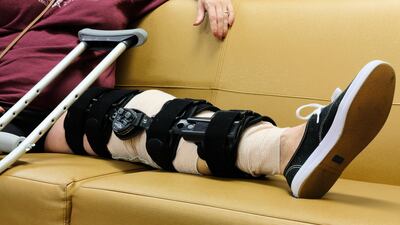Robotics
Vitestro's automated blood drawing robot received CE marking on August 28. The company is limiting release of the robot over the next 12 months to a small number of selected hospitals, with plans to scale up production thereafter.
Caresyntax said it will use the $180m it recently raised in a series C extension and debt financing round to build out its vendor-neutral surgery platform aimed to help surgeons with real-time and long-term decision support to improve patient outcomes and efficiencies.
J&J Medtech announced the FDA clearance of its dual-use robotics platform Velys Spine with plans to go to market in the first half of 2025.
This week, the US FDA sent a warning letter to maker of batteries for AEDs, AMCO; Virtual Incision successfully completed the first hysterectomy its miniaturized robotic-assisted surgery device MIRA; The DOJ finalized a rule that requires government-operated health care facilities to provide accessible equipment for people with disabilities; the FDA compiled its resources on reprocessed medical devices onto a new web page; and more.
CMR Surgical has launched a multicenter pediatric clinical trial for its Versius surgical robot system across three UK sites. The trial will enroll 150 children for urological procedures, with patient outcomes followed for up to a year post-surgery.
Quantum Surgical is on a mission to democratize minimally invasive cancer treatment. Its surgical robot Epione can treat inoperable abdominal and lung tumors using ablation. The company has treated over 500 patients across Europe and the US and secured €30m in funding to fuel expansion into Asia and into new cancer indications.
This week, AdvaMed and MITA win appeal to prevent repair companies from hacking medical devices, the FDA cleared Abbott’s Libre Rio CGM for OTC sales, J&J MedTech wins expanded clearance for Velys knee medical robot, the FDA updates its AI program, Canary Speech secures $13m in series A funding and Xeltis won FDA approval for an IDE submission to begin enrolling patients for a pivotal study for aXess.
Motif’s “pea-sized” Digitally programmable Over-brain Therapeutic (DOT) requires 20 minutes to implant and can be activated at home with a wearable to “lift the fog” for people with depression. Motif CEO Jacob Robinson believes data captured by brain-computer interfaces and continuous monitoring will eventually be able to identify key biomarkers that enable psychiatrists to head off mental health crises.
A novel robotic-assisted therapy could improve the lives of men with benign prostatic hyperplasia, real-world data presented at the annual meeting of the American Urological Association suggests.
Ekso Bionics’ exoskeleton received a final payment determination from the Centers for Medicare and Medicaid Services, paving the way to faster rehabilitation for more patients.
J&J MedTech joined forces with Nvidia to advance the integration of AI in surgery, including in devices, and allow for real-time data analysis to help surgeons with decision-making.
Medtech Insight's News We're Watching highlights some recent business and R&D developments you may have missed. This week, Biosense Webster’s Varipulse PFA platform earned a CE mark; Biosense Webster also announced the start the pivotal IDE study of its Laminar left atrial appendage elimination system; the FDA approved Boston Scientific's Agent paclitaxel-coated balloon and cleared Medtronic's OsteoCool 2.0 bone ablation system; three papers in Science Robotics describe magnetically controlled vascular robots that could go places wires and catheters cannot.
While the latest missions from NASA may seem like the stuff of science fiction, discoveries from outer space are not only unlocking the mysteries of the cosmos, but improving technologies used every day on Earth, including those in the medtech industry.
AAOS 2024: Stryker’s Lisa Kloes On Triathlon Hinge Implant, myMako For Mixed Reality Surgery Support
Stryker is showcasing its latest innovation in knee revision surgery, the Triathlon Hinge implant, and preparing to introduce a new myMako app to surgeons for anytime visualization and review of patients’ Mako surgical plans using Apple Vision Pro or iPhone.
Becton Dickinson is investing in high-growth segments and is on a mission to simplify its business. CEO Tom Polen’s 2025 strategy targets 25% operating margin from both innovations and durable core business combined, as senior BD executives told In Vivo during a break at J.P. Morgan 2024.
Becton Dickinson is investing in high-growth segments and is on a mission to simplify its business. CEO Tom Polen’s 2025 strategy targets 25% operating margin from both innovations and durable core business combined, as senior BD executives told In Vivo during a break at J.P. Morgan 2024.
In this second roundup from CES, Medtech Insight shines the light on Proto Hologram’s many use cases in health care, Intuition Robotics’ ElliQ robot to help the elderly feel less lonely, MIT AgeLab’s Aging Suit, Siemens/Unlimited Tomorrow’s partnership on a bionic prosthetic arm, and Earable Neuroscience’s Frenz Brainband to promote better sleep.
In this month’s Digital Health Roundup, Medtech Insight’s Marion Webb highlights interviews with Abbott’s head of Lingo Biowearables and top executives at Twin Health. Reed Miller provides an update on J&J MedTech’s launch of the Ottava soft-tissue robotic surgery system and Barnaby Pickering talks about his recent interview with Leo Grady, former CEO of Paige AI, to talk about his new start-up Jona.
After 27 years at J&J, Ashley McEvoy said she will resign as J&J’s executive vice president and worldwide chair of medtech. She will be succeeded by Tim Schmid who most recently served as chair of J&J Medtech Asia Pacific.
AI tools are increasingly making their way into behavioral health clinics to decrease the administrative burden of notetaking and other support tasks. Experts believe that AI tools and chatbots can offer patients benefits short of replacing the human therapist.
ADVERTISEMENT



















